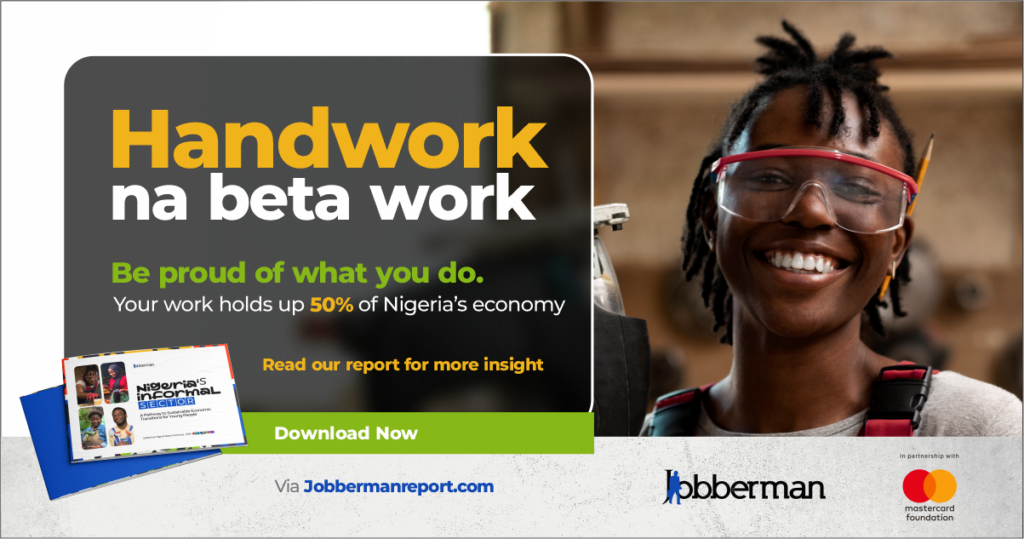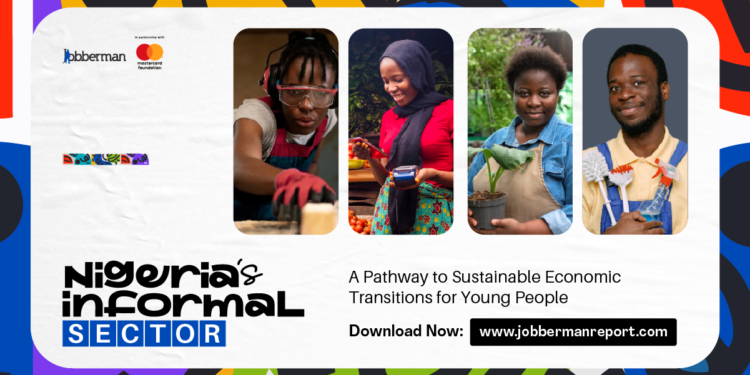Quick question: Did you know that a large chunk of people in the informal sector are actually educated? Your furniture maker could possibly have a degree! This is just one of the insights that makes this deep dive into the “unstructured” jobs in Nigeria very riveting.
Nigeria’s economy has sat comfortably on the shoulders of both the formal and informal sector, though those in the formal industries like to take credit for whatever weight and sustenance the economy has had. But new insight from our recent report has caused a shift in our perception of the “unstructured” sector.
Jobberman Nigeria released a research-based report on Nigeria’s informal sector, citing it as a pathway to sustainable economic transitions for young people.
The goal of our report are as follows
- Uncover Growth Trends: Examine how the informal sector is evolving across Nigeria and its impact on young people and women.
- Analyse Implications for Jobs and Skills: Explore how sector changes affect job opportunities and necessary skills.
- Identify Policy Needs: Highlight the policy adjustments needed to improve incomes and job experiences for youth and women.
We hope that this report helps anyone who reads it understand the undocumented system of employment with jobs in Nigeria outside the formal bucket.
Considering the sheer size of the informal sector, we carried out the research and divided the participants/findings into 4 core industries: Digital, Creative, Agricultural and Artisan.
Overview of the Core Industries
Where do you categorise the many different occupations and jobs in this large sector? Some jobs can fall into two different buckets. However, during the research, we put the different jobs and businesses into 4 buckets based on their scope of practice.
Digital
So what is the digital industry?
The digital industry encompasses the workers and businesses that use technology primarily. You may define it as businesses and workers whose scope of service or products are online and with technology.
Of course, the tech bros immediately come to mind. But according to our research, some of the workers you can also find in this industry include Point of Service (POS) providers, fintech services, affiliate marketing services, software providers.


With the proliferation of technology across health care, finance, agriculture, education and logistics, it’s no surprise that the digital industry is the third largest employer of labour in Nigeria. The NCC says this industry has created over 2.5 million jobs in Nigeria in the last decade!
Interesting, right? Read more. Download the full report.
Creative
When you hear the creative industry, you immediately think of the skit makers and musicians. But it also includes the fashion designers, artists, creative writers, entertainers, decorators and filmmakers.
The creative industry is a huge sector that peddles information or entertainment majorly. Right before the digital industry, the creative industry is the second largest employer of labour in Nigeria with over 4 million people in the sector.


However, contrary to what you may think, not every creative earns as they should. Our report shows that creative skills are under-rewarded especially by local demand.
Insights from our research also show that due to the gross lack of a defined pool and standard of practice, creative talents in the country are more susceptible to exploitation and underpayment.
A very interesting insight that came from our research in this industry is the high risk of sexual harassment due to unstructured working conditions. The industry appears to be rife with this issue. However, most of the parties involved prefer not to report it.
There’s more interesting info about this industry. Download the full report.
Agriculture


Ever wondered where your food comes from? You have the agriculture industry to thank.
The agriculture industry accounts for 36% of the labour force in Nigeria (No, they’re not all farmers). The industry includes crop production, livestock production and agro-processing.
Here’s an interesting fact from our research: from the 36% of the labour that is in the agriculture sector, 80% are smallholder farmers and they produce 9-% of the food you eat!
Women and young people are found more in the agro-processing part (harvesting and processing) than in the major work.
Additionally, we found that the industry is hiring more people and this is due mostly to business/industry expansion.
Download the full report to find out more about the industry.
Artisan


These are the ones who refer to their craft as “handwork”. They are called the services sector. Plumbers, carpenters, shoemakers, welders, bricklayers and fabricators are in the artisan industry.
Artisans are skilled workers and most times with no formal education. The sector is highly volatile and unstructured because it’s difficult for artisans to find regular jobs. There’s also no defined standard of skill proficiency.
Despite this, the artisan industry is a key contributor to the Nigerian economy. In 2020, it was valued at 718 billion USD.
A key driver of growth in this industry is digitisation and technology. Check out Artisan Oga and Workman. These are platforms that dignify these skills and provide more job opportunities with the wider reach it offers.
Read more about this industry: Download the full report.
General Key Insights
Here are a few general insights from our report on the informal sector.
- For over 50 years, the informal sector has dominated the employment trends in Nigeria
- 90% of new jobs are in the informal sector.
- The creative industry is the second largest employer of labour in Nigeria
- The agricultural industry is the biggest contributor to Nigeria’s economy.
- There are over 1.3 million registered POS agents in Nigeria and they’re in the digital industry too.
- Most informal sector workers earn between N30,000-N60,000
- 96% of workers in the informal sector have a degree
So what can stakeholders do to improve the informal sector in Nigeria?
Interventions to Improve Nigeria’s Informal Sector
- Develop local marketplaces for various types of small businesses.
- Implement a comprehensive skills training program with multiple learning options.
- Improve and streamline associations within the informal sector.
- Foster public-private partnerships to enhance social protection and benefits.
- Strengthen research and data collection to better understand the informal sector.
- Invest in high-growth potential sectors.
To Wrap Up
In a nutshell, our report takes you on a deep dive into how the informal sector is changing in Nigeria and what it means for young people and women everywhere. We’ve pinpointed key trends, looked at their impact on jobs and skills, and suggested policy tweaks to boost incomes and job satisfaction. For a better and fairer job market, it’s crucial to keep these insights in mind as Nigeria moves forward.To deepen your understanding, download the full report now.









